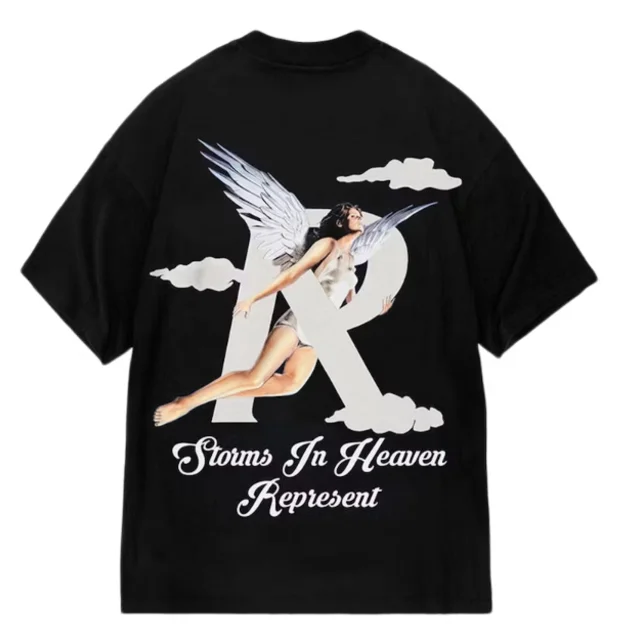The T-shirt, a garment that began as a basic piece of underclothing, has evolved into one of the most iconic and versatile items in modern fashion. This seemingly simple piece of apparel has transcended its utilitarian origins to become a canvas for self-expression, social commentary, and high fashion Represent T Shirt In this exploration, we will delve into the history of the T-shirt, its cultural significance, and its influence on contemporary style, revealing why it continues to captivate and inspire.
Origins and Evolution**
The T-shirt’s journey begins in the late 19th and early 20th centuries. Initially, it was part of the standard military uniform, serving as an undergarment worn beneath a uniform. Its practical design—a simple, short-sleeved shirt with a crew neck—was intended to provide comfort and functionality. In the 1950s, the T-shirt gained mainstream popularity when it was featured as outerwear in Hollywood films. Icons like Marlon Brando in RepresentHoodie A Streetcar Named Desire” and James Dean in “Rebel Without a Cause” wore T-shirts, which helped cement its status as a symbol of youthful rebellion and casual coolness.
The 1960s and 1970s saw the T-shirt’s transformation from a mere piece of clothing to a medium for personal and political expression. The rise of counterculture movements, including the Civil Rights Movement and the anti-Vietnam War protests, led to the popularization of T-shirts featuring slogans and graphics Represent Clothing These T-shirts became a way for individuals to express their beliefs and connect with larger social movements.
Cultural Significance
The T-shirt’s ability to serve as a platform for communication and self-expression has been pivotal in its cultural significance. During the 1980s, the T-shirt became a staple of pop culture Represent with rock bands and artists using it as a promotional tool. Bands like The Rolling Stones and The Ramones released merchandise that featured their logos and album art, turning the T-shirt into a collectible item and a way for fans to display their allegiance.
The 1990s and early 2000s introduced a new wave of T-shirt culture with the rise of graphic tees and streetwear. Brands like Supreme, Stüssy, and Off-White began to blend high fashion with street style Represent Sweatshirt making the T-shirt a cornerstone of urban fashion. This era saw the T-shirt evolve from a casual garment to a symbol of status and exclusivity. The T-shirt became a statement piece, reflecting the wearer’s identity, taste, and cultural affiliations.
High Fashion and Designer T-Shirts
In recent years, the T-shirt has solidified its place in high fashion. Designers and luxury brands have embraced the T-shirt, transforming it into a high-end fashion statement. Renowned fashion houses like Gucci Represent Jeans Balenciaga, and Louis Vuitton have incorporated T-shirts into their collections, using premium fabrics, intricate designs, and bold logos. These designer T-shirts often feature artistic prints and sophisticated tailoring, elevating the T-shirt from its humble origins to a symbol of opulence and style.
This integration of T-shirts into high fashion reflects a broader trend towards casualization in the fashion industry. The traditional boundaries between casual and formal wear have blurred, with designers experimenting with new ways to incorporate casual elements into their collections. The T-shirt, with its versatile and adaptable nature, has become a key player in this trend, proving that it can be both comfortable and chic.
Sustainability and the Future of the T-Shirt
As we move towards a more sustainable future, the T-shirt industry is also evolving. The rise of fast fashion has led to increased environmental concerns, prompting both consumers and designers to seek more sustainable practices. Many brands are now focusing on eco-friendly materials, ethical production processes, and transparent supply chains. Organic cotton, recycled fabrics, and low-impact dyes are becoming more common in T-shirt manufacturing, reflecting a growing awareness of the environmental impact of fashion.
Additionally, the concept of “slow fashion” is gaining traction. This movement encourages consumers to invest in high-quality, timeless pieces rather than constantly purchasing new items. The T-shirt, with its enduring appeal and versatility, fits perfectly into this philosophy. A well-made T-shirt can be worn for years and styled in countless ways, making it a sustainable choice for fashion-conscious individuals.
Cultural Icons and Influencers
The T-shirt’s influence extends beyond traditional fashion boundaries into the realm of celebrity and social media culture. Influencers and celebrities frequently use T-shirts to make statements, promote causes, and connect with their audience. Custom T-shirts featuring slogans, artwork, or personalized messages are often seen in the wardrobes of high-profile individuals, further highlighting the T-shirt’s role as a medium for personal expression.
Social media platforms like Instagram and TikTok have also played a significant role in shaping T-shirt trends. Viral challenges, meme culture, and influencer collaborations have brought new styles and designs to the forefront. T-shirts featuring popular memes, slogans, or limited-edition prints quickly gain traction online, demonstrating the garment’s adaptability to contemporary trends and digital culture.
Conclusion
The T-shirt’s journey from a simple undergarment to a global fashion staple is a testament to its enduring appeal and versatility. Its evolution reflects broader cultural and societal changes, from its role in rebellious youth culture to its place in high fashion. The T-shirt’s ability to adapt and reinvent itself ensures its continued relevance in the ever-changing landscape of fashion.
As we look to the future, the T-shirt will undoubtedly continue to evolve, influenced by new trends, technological advancements, and cultural shifts. Whether as a canvas for personal expression, a statement of style, or a symbol of sustainability, the T-shirt remains a powerful and influential piece of clothing. Its timeless design and adaptability make it a lasting icon in the world of fashion, one that will continue to inspire and resonate with people around the globe.

No Responses